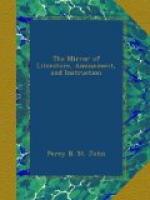* * * * *
To lie at the Pool of Bethesda is used proverbially in Germany, in speaking of the theological candidates who are waiting for a benefice.
* * * * *
Court Pun.—The witty Marquess de Bievre was asked by Louis XV. for a pun. “Give me a subject, sire,’” said B. “Make it on myself,” said Louis. “Sire, the king is not a subject,” was the pleasant reply.
* * * * *
History.—The first page of Thucydides is, in my opinion, the commencement of real history. All preceding narrations are so intermixed with fable, that philosophers ought to abandon them in a great measure, to the embellishment of the poet and orator.—Hume.
* * * * *
Old Squibs.—Richard Bentley and Charles Boyle (Earl of Orrery,) had a warm dispute relative to the genuineness of the Greek Epistles of Phalaris, an edition of which was published by the latter. Bentley was victorious, though he was kept in hot water with the critics and wits of the age. Dr. Garth assailed him thus:
So diamonds owe a lustre to their foil,
And to a Bentley ’tis we
owe a Boyle.
Conyers Middleton was a sad thorn in Bentley’s side, from the latter having called the former, when a young student in the university, fiddling Conyers, because he played on the violin. A punning caricature represented B. about to be thrust into the brazen bull of Phalaris, and exclaiming, “I had rather be roasted than Boyled.”
* * * * *
Hip, Hip, Hurra!—During the stirring times of the Crusades, the chivalry of Europe was excited to arms by the inflammatory appeals of the well-known Peter the Hermit. While preaching the Crusade, this furious zealot was accustomed to exhibit a banner emblazoned with the following letters, H.E.P., the initials of the Latin words, "Hierosolyma Est Perdita,” Jerusalem is destroyed. The people in some of the countries which he visited, not being acquainted with the Latin, read and pronounced the inscription as if one word—HEP. The followers of the Hermit were accustomed, whenever an unfortunate Jew appeared in the streets, to raise the cry, “Hep, hep, hurra,” to hunt him down, and flash upon the defenceless Israelite their maiden swords, before they essayed their temper with the scimetar of the Saracen.—Tatler.
* * * * *
Wool-gathering.—A very patriotic landlord, Squire Henry, of Straffan, county of Kildare, had hit on an expedient to benefit the wool-growers in general, and his numerous tenantry in particular. Knowing that market value is in the direct ratio of demand and scarcity, he annually buried the wool shorn from his own sheep, lest it might interfere with the profitable sale of his tenants’ fleeces. But, alas! this generous system of self-sacrifice did not “work well.” The result was—though Squire Henry never suspected the existence of such turpitude in the human heart—the ungrateful tenantry dug up by night what he buried by day, wool never rose in price, and they never were able to pay up their arrears of rent.—Fraser’s Magazine.




